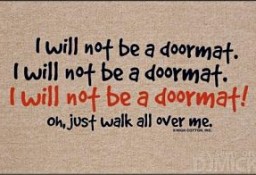Entering the world of work is like walking through a door. Previously, we could follow a simple formula—go to school, get good grades, go to college or university, get good grades, which gets you a good job, then live a good life. We all knew which door to walk through. This was the “grand narrative” or post-WWII social contract that characterized the working lives of people lucky enough to be born and raised in the Western world.
Not anymore. The new millennium ushered in a new social arrangement of work, a post-industrial order, fuelled by information technologies, global economics, cultural diversity, and postmodern ideas.
Uncertainty. That’s the new buzzword for the workplace of 2014 and beyond. How we respond to these profound changes is crucial to our physical, mental, and social well-being. In the words of William Arthur Ward “The pessimist complains about the wind; the optimist expects it to change; the realist adjusts the sails.”
We can be doormats and let these new social realities walk all over us (or hope, unrealistically, they never show up at our door).
Instead of being passive, we can be pro-active and cross the threshold of despair or denial by putting ourselves into the driver’s seat to navigate successfully through obstacles.
The cradle-to-grave job security of the Industrial Age still exists but, paradoxically, only in the most non-industrialized sector—the public service at all levels of government, and that security will be challenged by demands for harmonization with less stable private sector working conditions.
For an increasing number of individuals, then, this new reality of work in the Information Age involves job prospects that are far less definable, predictable, or stable…especially for young adults who are finding it increasingly difficult to break into good jobs.
Unfortunately, this is increasingly true for mid-lifers too! Midlife is a normal developmental life stage that occurs usually between 35-55 years of age. I’m seeing a growing number of layoffs in this age group. Take the newspaper industry as one example. The chances of finding a similar job in the same sector for a senior journalist, editor, manager is very difficult–almost impossible– as online news sources replace the traditional business model of print ads supporting news. The same goes for many other sectors of the economy that are facing significant changes due to de-industrialization, organizational mergers, downsizing, economic restructuring, and other factors.
While the wider world of work is changing as we speak, what has not changed is the importance of work in the lives of individuals, as a means for survival, power, self-worth, social connection, or self-determination. The meaning and purpose of work for many of us as will be severely challenged in the next decade.
Since we can’t count on that simple formula or grand narrative anymore for guiding our career decisions, we need to focus on our individual narratives or stories to help us navigate through this grave new world of work. For the past 20 years, I have helped young adults find a career job and helped mid-lifers make effective career changes. I do it by constructing a new story for my clients, one that empowers them to see the road ahead and make decisions that put them in charge of their career. How I do so is explained in this short video and at this link.
Understanding who and what you are in terms of work—not a narrowly-defined job description but the kind of work you are suited for and needs doing in the world—is needed to survive and thrive in today ’s uncertain labor market. Current labor-market realities are changing. For example, there is a big shift in North America from a manufacturing to a service economy, whether we like it or not. Having clarity about your career identity—who and what you are in terms of a work-based value proposition—gives you more ability and flexibility to adapt to the changing labor market. Your story holds the key to your adaptability, your prospects of making a successful change when the time comes…and it will come!
Career transitions are now and will continue to be more frequent and, perhaps, more difficult here in North America. Are you ready?



I like what you guys are up too. This sort of clever work and coverage!
Keep up the terrific works guys I’ve included you guys to my personal
blogroll.
My blog – homepage (Bertie)
Much appreciated, thank you!